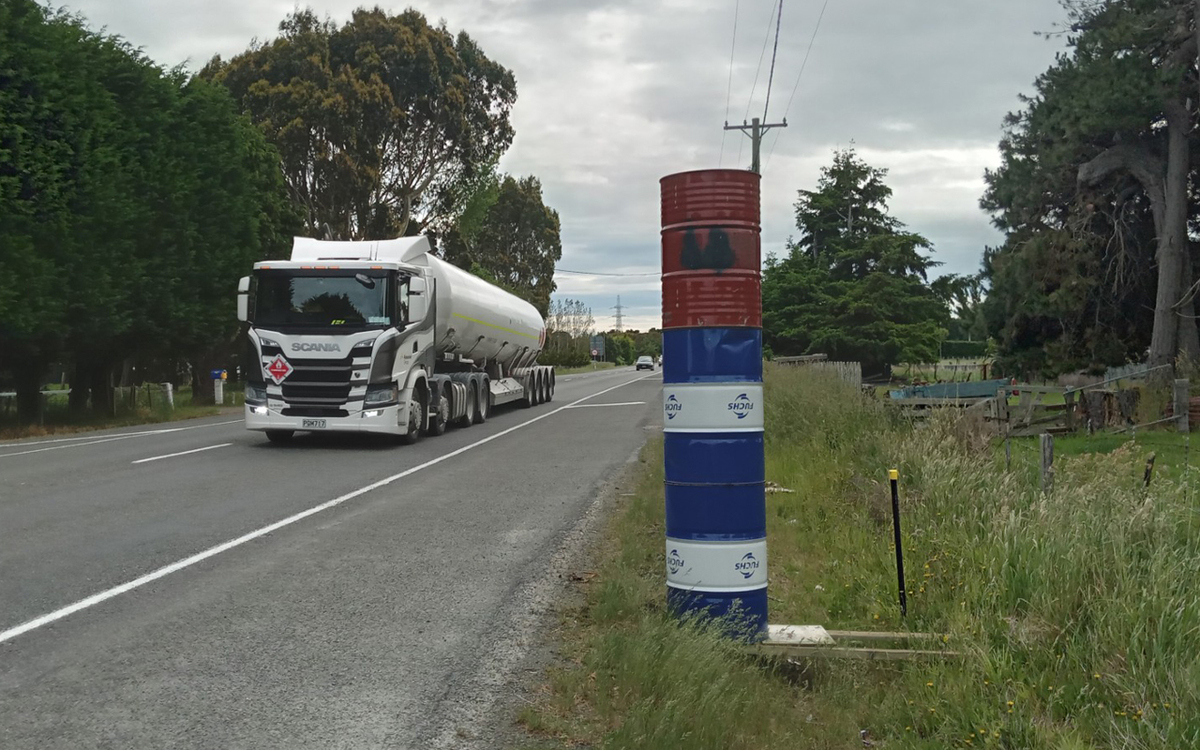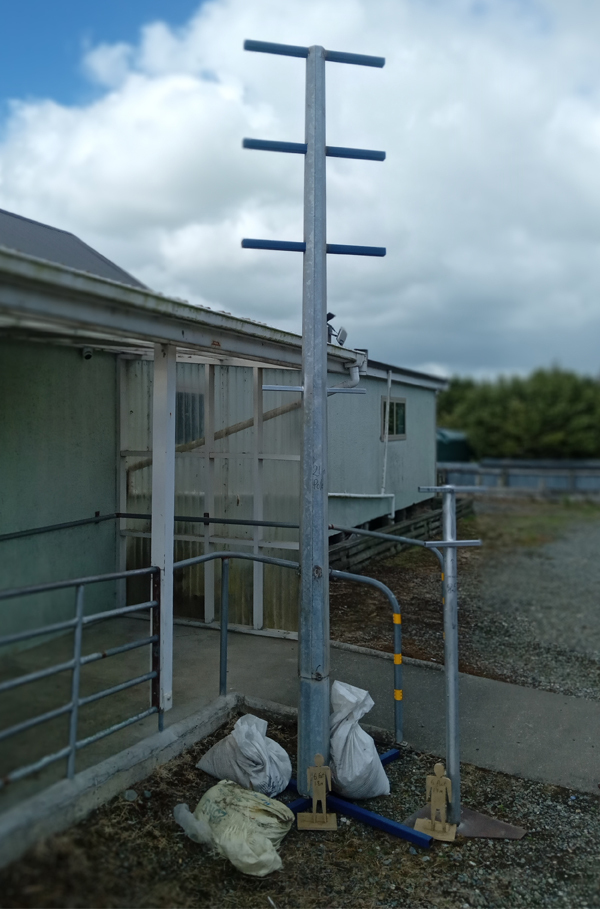Council accused of 'unsafe and rushed decision making' over power lines
Reporting by RNZ
05 March 2025, 6:48 PM
 Mill Road South resident Tony Drozdzak's mock-up of how close the proposed new poles will be to the road. Photo: Tony Drozdzak/Supplied
Mill Road South resident Tony Drozdzak's mock-up of how close the proposed new poles will be to the road. Photo: Tony Drozdzak/SuppliedInvercargill City Council needs to do the "right thing" and revoke consent for new giant powerlines, says Taieri's MP.
About 144 properties will be affected by PowerNet's Awarua 66kV line upgrade, which will see giant powerlines 21 meters high installed along Findley Road, East Road, Mill Road South, Mason Rd and George Road in Invercargill.
Several of these will be replacing much smaller existing power poles.
Labour MP for Taieri Ingrid Leary said the council granted PowerNet resource consent within 15 days and did not notify any of the affected residents.
"The City Council needs to ask the Environment Court to either withdraw the consent that it lodged or to give a directive requiring the consenting process to start again.
"This is just unsafe and rushed decision making."
Leary said that some of the planned powerlines were perilously close to the highway and "would cause absolute carnage if trucks or cars were to collide with them".
Several crashes had been identified on parts of State Highway 1 and the surrounding roads over the past five years.
She said the Awarua project was also causing mental distress for some of the affected residents.
Some residents were facing a potential drop in property values, but it was unclear if they would be able to get compensation.
Leary said if affected homeowners were entitled to compensation that compensation may have to come from other ratepayers, whose rates could be impacted in turn.
Leary said that would be a topic at a public meeting she planned to hold in the next few weeks.

A scale model (left) of the size of the proposed new power poles, compared to a 183cm (6 foot) person. On the right is a scale model of a regular power pole. Photo: Tony Drozdzak/Supplied
Resident left baffled
Tony Drozdzak, who lives on Mill Road South, said residents on his street first became aware of the plan to install powerlines when they made some enquiries about some waratahs that had been installed.
He said they then found that powerlines were being installed and that the council had already signed off the resource consent.
Drozdzak said after expressing their concerns to the council, they were told there was not much that could be done.
Drozdzak said people in the area were worried about both the safety risk the Awarua project posed and how it would affect their properties.
He said a real estate agent had predicted that property values could be reduced by 20-25 percent for those that had a giant power pole outside their house, and people were also concerned how it might affect their ability to sell their properties.
Drozdzak was also concerned that having giant power poles installed so near properties could mean landowners would have to seek consent from the power company to make certain modifications.
The New Zealand Electrical Code of Practice for Electrical Safe Distances NZECP 34 sets down minimum distances allowed between any new buildings/structures and overhead lines.
Drozdzak was baffled why PowerNet had opted to install the powerlines so near houses and the state highway rather than on farmland.
PowerNet says chosen powerline locations cost efficient
PowerNet said the Awarua upgrade was about supporting industrial customers' decarbonisation efforts and ensuring there was an adequate, reliable electricity supply to Awarua, South Invercargill and Bluff for the next 50 years.
"It's the first stage of the Awarua Network Project - which also includes upgrades to the Transpower Grid Exit Point at Findlay Road and building a new substation at Awarua," said a PowerNet spokesperson.
"These upgrades will increase electricity capacity and future-proof supply in the southern region for the benefit of all customers."
The spokesperson said the route chosen for the upgrade was optimal. It had robust infrastructure robust, was easily maintained and cost-efficient.
The spokesperson said full safety assessments of the Awarua project had also been completed and the information provided to residents.
"Electricity networks, including PowerNet, have rights to build and maintain lines in road reserves which are owned by roading authorities. These rights are granted under the District Plan, the Electricity Act and Resource Management Act, and landowner payments are not prescribed. This is consistent throughout New Zealand."
PowerNet believed concerns around property modifications would mostly apply to conductive fencing.
"In planning the Awarua line upgrade, the appropriate exclusion zone around existing conductive fencing has been taken into account to mitigate the impact on residents as much as possible."
"PowerNet will not unreasonably withhold consent for the construction of new conductive fences, but will ensure that all works can be undertaken safely and without risk to residents."
Resource consent not required says council
Invercargill City Council consenting and environment manager Jonathan Shaw said resource consent was applied for under a much larger project, totalling 19.6km of power lines.
It was only required for seven poles measuring a distance of 0.6km along the south side of Findlay Road in the road reserve by Ascot Park racecourse.
The rest of the build is permitted under the Invercargill District Plan and the National Environmental Standards for Electricity Transmission Activities.
"So (it) does not require resource consent," he said.
The Resource Management Act gives the local councils that greenlit resource applications the ability to go back and review those resource consents, he said, but not to consider alternatives such as underground lines or different routes.
Council also can cancel a consent that is under review, said Shaw, but that "this application does not meet the threshold for such a review."
Published by permission